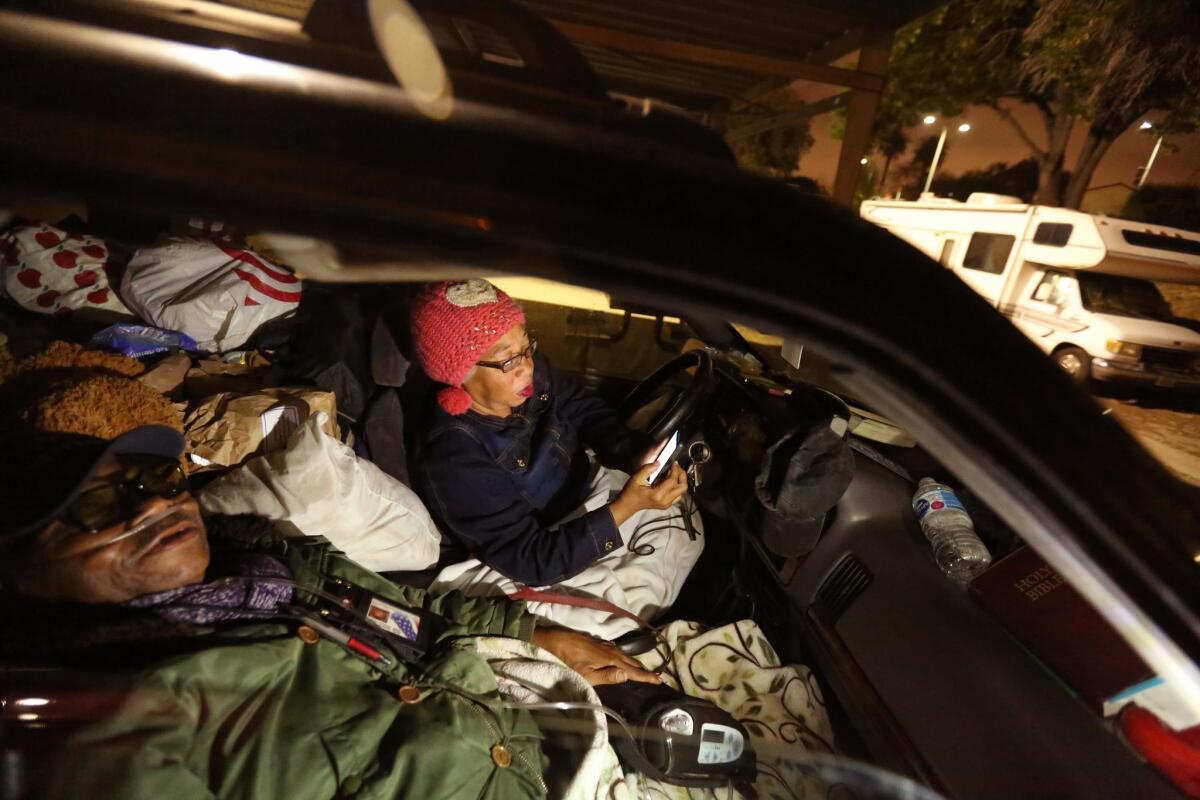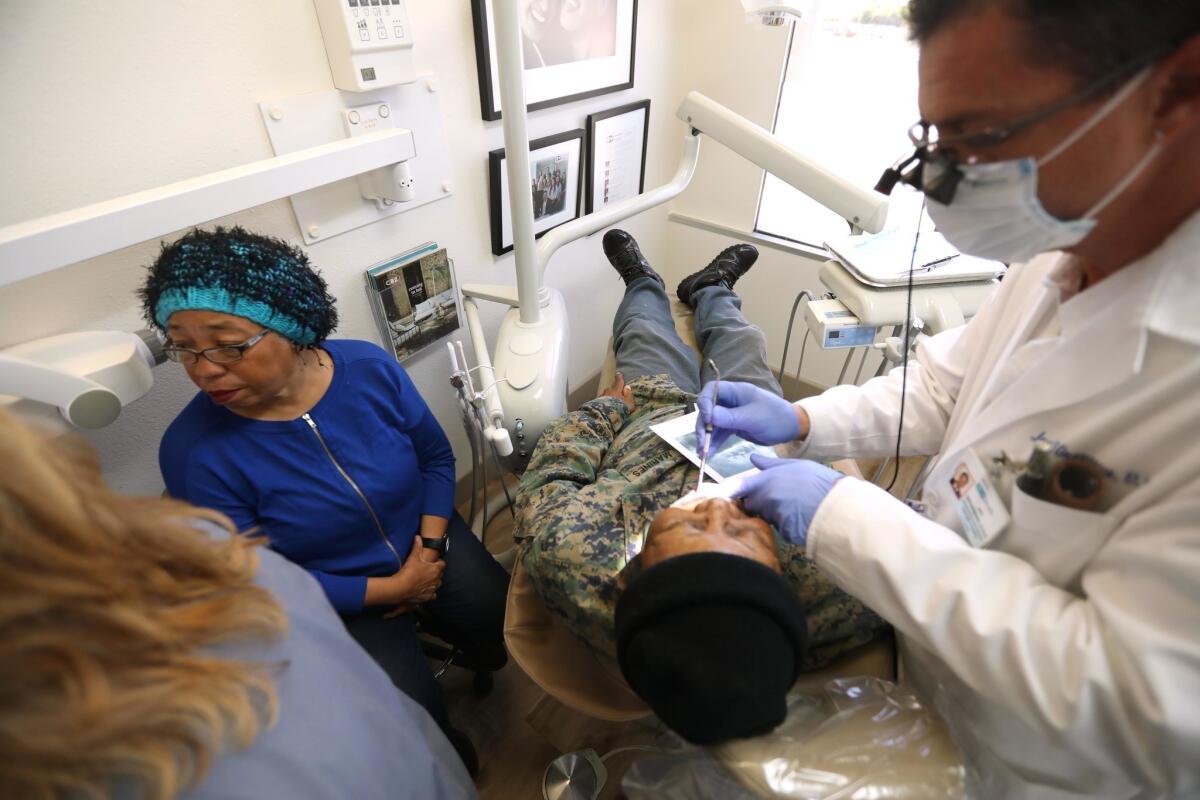Living in a beat-up Jeep after mounting hardship, a homeless veteran and his wife cling to hope, waiting for a place to call home

Lawrence and Carla McCue listened from the last row as the mayor spoke to veterans at the Los Angeles National Cemetery on Memorial Day.
Lawrence, 75, proudly wore his Marine Corps outfit and sat in his motorized wheelchair, with his dog Oreo at his feet. Carla, 62, snapped photos.
Veterans and their families had come from across Southern California for this event. The McCues traveled from across the street in a Jeep Grand Cherokee that, like the couple, had seen much better days.
For months, they had been living on the Department of Veterans Affairs' West Los Angeles campus in their car with Oreo. Like many senior citizens and veterans, their journey into homelessness was filled with health emergencies, financial upheaval and a persistent struggle to find a place they could truly call home.
In January they came to the campus. Their car was their home. It was filled with the essentials of their life — clothes, Oreo’s chew toys and Lawrence’s oxygen machine.
At night, they drove the Jeep from the parking lot near the main hospital to a small alcove nearby. They were granted refuge there through a program called Safe Parking LA that allows homeless people to sleep in their cars without worrying about being arrested.
One winter day, they filled out an application to live in a development called the El Segundo Boulevard Apartments that is under construction. If they qualified, they could get a housing subsidy through a U.S. Department of Veterans Affairs program. Lawrence’s disabilities seemed to make them perfect candidates for one of the building’s units, which state records said would serve “special needs tenants.”
As the couple sat on the VA campus, reading the Bible and speaking with their children over the phone, they began to imagine a brighter future. The clock began to tick on their application for the residence.
“Homelessness and poverty is like being held captive, you know, like you're a prisoner, and you're waiting for someone to find you,” Carla said. “Hopefully you live long enough for someone to find you in time and to get you out of captivity.”
The recent annual homeless count in Los Angeles had some good news for veterans. The number living on the streets was down 18% year-over-year. But for senior citizens — a very vulnerable group — the numbers were more worrying. There was a 22% surge in the number of elderly homeless people like Lawrence McCue. That’s nearly 5,000 people who are 62 or older and an additional 8,000 people who are in their mid-50s to early 60s.
Sometimes McCue’s memories of hard times aren’t so clear, and dates don’t always line up. But one thing is clear: The couple didn’t always live like this. They met in 1986, when Carla worked in recreation services at Ladera Park.
Lawrence was there with his son, and she noticed he carried a Bible.
“God bless you, my brother,” she said she told him. “And he said, ‘Nice to meet you, charming young lady’ or something like that. And, well, he said that fireworks went off in his head.”
Later Lawrence had his young son ask for her number. They went to church on their first date. In the fall of 1987, they were married in Las Vegas.
For years, they worked as dorm parents at American Intercontinental University in Los Angeles. Eventually, Carla began working for different properties owned by Marriott Hotels, spending 25 years with the chain.
Lawrence had received his honorable discharge from the Marine Corps in June 1964, shortly before the Gulf of Tonkin incident and the escalation of the Vietnam War. From there, he made a career for himself, playing guitar in a band and working alongside musicians like famed producer Bobby Day.
“That was a gift that I had, and it brought me a lot of work,” he said.
As they got older, the hardships began to pile up. Their jobs could not keep up with rising rents. And well-paying jobs were hard to come by.
Lawrence’s health increasingly worsened.
Recently, a doctor told Lawrence that his kidneys were functioning at 19% of their capacity.
Before that though, there was tendon damage in his hand. Then there was rheumatoid arthritis, Type 2 diabetes, congestive heart failure and a herniated disc pressed against his sciatic nerve. It got so bad that about a decade ago, for a spell, Lawrence could not move without excruciating pain.
At the time, the couple was living in a motor home, which they parked for about five years by the Hertz rental car lot near the Los Angeles International Airport. That allowed Carla to easily come home to Lawrence after working at the Renaissance Los Angeles Airport Hotel.
Soon, they lost the motor home. About three years ago, the McCues weren’t able to afford the parts that would’ve made the RV compliant after a smog check. Eventually, the vehicle was towed away.

After a brief stay at a senior citizens home in the Inland Empire, the couple began living in their Jeep near the airport.
Every day, Carla would get her husband situated with his Bible before heading to work. When the day ended, she’d come back, walk the dog and settle in. To guests at the Renaissance hotel, Carla was a bubbly front-desk employee with a wide, toothy smile and a polite demeanor.
They likely had no idea how her days ended.
“Fortunately [the hotel has] a locker room where I could shower and change and you know, I had a uniform,” she said. “Then I would go in and put on my smile and be ready to be a blessing to the guests.”
On New Year’s Eve of last year, Carla retired to spend her time caring for Oreo and her husband. After months of living in the parking lot, their lives had been injected with a dose of optimism. They met Sergio Aguilar, a social worker who specializes in helping veterans with the nonprofit People Assisting the Homeless.
He helped them fill out applications for the El Segundo Boulevard Apartments, being constructed near the 105 and 110 freeways.
“We were hoping to be in there by Oreo’s birthday, which is May the 31st,” Carla said this spring. “We were expecting to be able to start June 1st in our new home.”
As the date got pushed back, Aguilar helped them get set up with a 45-day motel voucher at the Holloway Motel in West Hollywood. Their move was delayed several days, because the LA Pride Parade had filled up the motel. The move out of their car was a great relief — particularly for Lawrence, whose legs had become badly swollen because of the cramped conditions. After checking into the motel, he was admitted to the hospital when his lungs began to fill with fluids. Another hospital visit meant more bills. A dentist told Lawrence it would cost $26,000 to fix his teeth and infected gums.
Still they remained hopeful that they would eventually move into the apartment complex. The motel was an improvement, but the room smelled of cigarettes, the sheets were soiled and cocaine was being sold out of a neighboring room.
Carla purchased disinfectant wipes and a special seat so Lawrence didn’t have to stand in the shower.
In late June, the couple struggled to figure out how to stretch out $20. Between the two of them, they say they receive a little more than $1,700 a month in Social Security benefits. But that money was all but gone, and the end of the month was still more than a week away.
Happy to not think about these problems for a couple of hours, they piled into the car and headed to Bible study in Culver City. Seated around the table, they laughed with friends and read from Genesis in the Old Testament. It was also an opportunity for them to get a free meal.
Carla made sure to have several helpings of the chicken along with four slices of watermelon and bunch of cherries. Lawrence, wearing a camouflage jacket and using a cane rather than his electric wheelchair, didn’t have much of an appetite. But he followed along closely on his phone, using an app to read relevant biblical passages.
Before the Bible study, Carla checked the engine of their Jeep. Their car was a constant source of stress and expense, its balkiness always threatening to complicate their life further. After the study, the Jeep finally gave out.
With the help of their Bible study friends, they jumped the car and made it back to the Holloway Motel. Still, the Jeep would require close to $1,000 in repairs to work consistently.
“It’s our little mobile house,” Carla said with a smile.
Several days later, the McCues got more bad news. Aguilar told them their application to live in the El Segundo Boulevard Apartments had been rejected.
Aguilar explained the couple’s shared income from Social Security, just enough to cling to a tenuous life, meant they made too much money to be eligible for the unit. Some of the apartments had been set aside for people making more money, and if they had applied for one of those units they might have been accepted — though that was far from guaranteed.
“They’re in poverty but they’re considered over-income,” said Aguilar, who tried and failed to appeal directly to the property manager and described this situation as rare.
After months of waiting, the McCues are back to the beginning. Their motel voucher ran out. Their car, which had been in the shop getting repaired, is working again. Aguilar continues to help them search for a home but left without a permanent solution, they’re heading back to the VA parking lot.
As she stood in the dog park watching Oreo play, Carla remained upbeat.
“I’m hoping that by fall that we will be spending the holidays —Thanksgiving and Christmas and our anniversary — in our permanent place,” she said.
Her husband of almost 31 years, on the other hand, couldn’t help but feel down.
“I’ll just stay in that car until it breaks down again,” Lawrence said.
Twitter: @boreskes
Sign up for Essential California
The most important California stories and recommendations in your inbox every morning.
You may occasionally receive promotional content from the Los Angeles Times.








